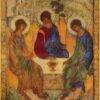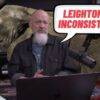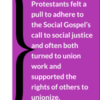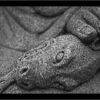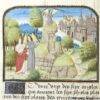On The Trinity
The following is part of something I wrote back in 2008 on a doctrine of the Trinity. It requires greater context, particularly as these things relate to God’s freedom in election. But I’m simply going to parachute this in without its further context, to be provocative. With the above in mind, apply this being/becoming in the life of God to the incarnation of Christ; what does this imply? It implies that in the very ousia or being of God, the Son is always and already becoming deus incarnandus (God in the flesh Jn 1:14). In other words, what Jesus becomes in ‘historic time’, in…
For what shall we pray?
“For what shall we pray?” is a weekly post inviting individuals, groups, and congregations to lift up our world in prayer. This resource is prepared by a variety of leaders in the ELCA and includes prayer prompts, upcoming events and observances, and prayer suggestions from existing denominational worship materials. You are encouraged to use these resources as a starting point, and to adapt and add other concerns from your local context. More information about this resource can be found here. In the coming weeks, those in the United States will mark two significant anniversaries: five years since the murder…
On a James Whitean and Leighton Flowersian Naked Reading of the Bible
Thumbnail created originally by Leighton Flowers (Caleb) I was listening to James White live today on his Dividing Line vlogcast, and what he reinforces over and over is that he is what some are calling a ‘biblicist,’ or what I would identify as a solo Scriptura or nuda Scriptura proponent, as far as the way that he approaches Scripture. In this way, James White and his archnemeses, Leighton Flowers, ironically affirm the same bibliology and its attending hermeneutic. It is both modern, postEnlightenment, and Lockean (i.e., tabula rasa) in orientation. That is, it sees Scripture and its reception in a…
Dignity of Work Historically and Today
By Emily Ahern, ELCA Hunger Advocacy Fellow [About the Author] On May 1st, many observed the public holiday May Day, otherwise known as International Workers’ Day. This day is set aside specifically to commemorate working class people and to shed light on the demands made by people involved in the labor movement. Christians have intertwined with this movement, historically and today, and Lutheran teaching shapes our point of view. A HISTORICAL PERSPECTIVE May 1 was specifically chosen to commemorate the strike which would culminate in the Haymarket Riot, a clash between labor protesters and police on May 4, 1886…
May 25, 2025–Flourishing Together
Catalyst Question Who are the most helpful people in your life? What makes them so helpful for you? Flourishing Together Recently, Baylor University researchers released initial results from a new study on human flourishing. This global research follows hundreds of thousands of people in hopes of understanding what factors lead to a “good life.” That’s how the researchers understand flourishing. More than personal happiness or security, flourishing is a kind of holistic satisfaction. More than just feeling happy in the moment, to flourish is to feel like you’re thriving in most, if not all, areas of life. The results were…
Abortion, Sex Trafficking: Its Antidote in the Strength of the Babe from Nazareth
O Lord, our Lord, How excellent is Your name in all the earth, Who have set Your glory above the heavens! 2 Out of the mouth of babes and nursing infants You have ordained strength, Because of Your enemies, That You may silence the enemy and the avenger. –Psalm 8 I want to underscore one simple yet profound point by way of reflection on the above Scripture. ‘Out of the mouth of babes and nursing infants You have ordained strength.’ Ultimately, we understand as Christians that there is an archetype Babe elected for the world from eternity past, born of the Virgin Mary, wrapped in swaddling cloths and…
For what shall we pray?
“For what shall we pray?” is a weekly post inviting individuals, groups, and congregations to lift up our world in prayer. This resource is prepared by a variety of leaders in the ELCA and includes prayer prompts, upcoming events and observances, and prayer suggestions from existing denominational worship materials. You are encouraged to use these resources as a starting point, and to adapt and add other concerns from your local context. More information about this resource can be found here. In the coming weeks, those in the United States will mark two significant anniversaries: five years since the murder…
Index of the May 2025 Issue
Issue 99 of Administration Matters Online Bible Studies — 2025 ELCA Churchwide Assembly Join ELCA Churchwide Assembly voting members in preparing for the assembly! All are welcome to participate in the online Bible studies that will be held Wednesday evenings in July (July 9, 16, 23). Each session will focus on the assembly theme “For the Life of the World” through one of three lenses: climate justice, gender justice, and war/conflict and reconciliation, followed by engagement with these Bible study presenters: • July 9 — Willie Korboi (climate justice lens) • July 16 — Deacon Clare Josef-Maier (gender justice lens) • July 23…
Biblical Studies Has Failed the City of God
I read NT exegetes, particularly in their commentaries on Paul’s theology, and wonder if they ever wonder if they should in fact be doing so from the theo-logic inherent to the homoousion (the notion that Jesus is both fully God and fully human). Most don’t do this, which illustrates the flaw of their discipline-specific training in Biblical Studies. In other words, just as anti-supranaturalism has yeasted the discipline itself—that is to say, to approach the Bible as if it doesn’t have an inner, antecedent, supranatural reality; and that it can be read purely and critically as a historical artifact—it is…
For what shall we pray?
“For what shall we pray?” is a weekly post inviting individuals, groups, and congregations to lift up our world in prayer. This resource is prepared by a variety of leaders in the ELCA and includes prayer prompts, upcoming events and observances, and prayer suggestions from existing denominational worship materials. You are encouraged to use these resources as a starting point, and to adapt and add other concerns from your local context. More information about this resource can be found here. In the coming weeks, those in the United States will mark two significant anniversaries: five years since the murder…
